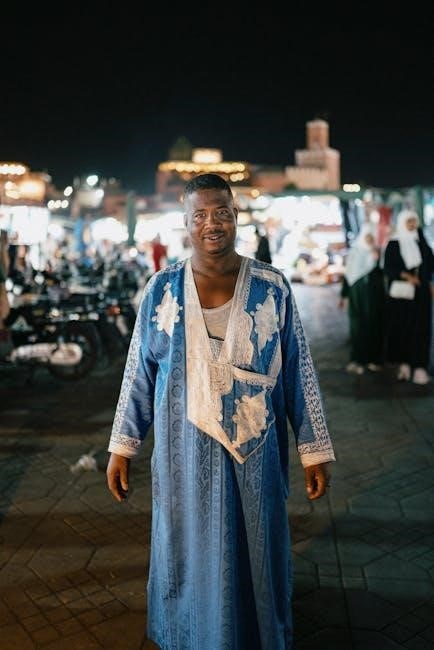
Feminism challenges traditional gender roles, prompting men to redefine masculinity. This shift sparks debates on power, identity, and equality, reshaping societal expectations and fostering inclusive change.
Understanding the Transformation of Gender Roles
The transformation of gender roles has been a gradual process, influenced by historical events and feminist movements. Traditional masculine roles, once centered on power and control, have faced challenges as women entered the workforce and societal expectations shifted. Men have experienced confusion and resistance, particularly in response to feminist critiques of privilege and dominance. However, many have also embraced new understandings of masculinity, aligning with feminist principles of equality and emotional expression. This evolution reflects broader societal changes, where gender roles are no longer rigidly defined, allowing for more fluid and inclusive expressions of identity. The journey remains complex, with ongoing debates about power, identity, and equality.
The Intersection of Feminism and Masculinity in Modern Society
Feminism and masculinity intersect in modern society through evolving definitions and challenges. Traditional masculine norms, such as dominance and emotional suppression, are increasingly questioned as harmful. Feminist movements emphasize gender equality and mutual respect, prompting men to reevaluate their roles. This shift is evident in media and public discourse, where new expressions of masculinity are explored. While some men resist these changes, others embrace them, leading to a more nuanced understanding of gender. The integration of feminist principles into masculinity encourages emotional openness and shared responsibilities, fostering a society where both genders can thrive without rigid constraints. This intersection remains a vital area of discussion and growth.
Historical Impact of Feminism on Masculinity
Feminist movements historically challenged traditional masculine norms, prompting men to question rigid stereotypes. This led to a transformation, as societal expectations of men evolved toward inclusivity and equality.
How Feminism Changed Traditional Masculine Roles
Feminism has significantly altered traditional masculine roles by challenging rigid stereotypes. Men are now encouraged to embrace emotional expression and share domestic responsibilities, fostering a more balanced societal structure.

Men’s Reactions to Feminist Movements: Resistance and Acceptance
Men’s reactions to feminism vary widely, ranging from resistance to acceptance. Some view it as a threat to traditional power structures, while others embrace the opportunity to redefine masculinity and support gender equality, leading to a diverse range of responses within society.

The Concept of New Masculinities
New masculinities emphasize redefining traditional gender roles, fostering emotional expression and equality. This shift challenges outdated norms, promoting a more inclusive understanding of masculinity in modern society.
Redefined Masculinity in the Context of Feminism
Feminism has prompted men to reevaluate traditional masculinity, embracing emotional expression and collaboration over dominance. This shift challenges societal norms, encouraging men to step away from rigid gender roles. By aligning with feminist values, men can redefine strength as vulnerability and empathy, fostering healthier relationships and personal growth. This redefined masculinity promotes equality, allowing men to break free from stifling expectations and embrace a more authentic identity. However, this transformation is not without challenges, as societal resistance and internalized norms often hinder progress. Ultimately, redefined masculinity in the context of feminism offers a pathway to liberation for all genders, fostering a more inclusive and equitable society.
Debates on Reforming or Abolishing Traditional Masculinity
Debates surrounding traditional masculinity focus on whether it should be reformed or abolished. Some argue that reforming masculinity involves retaining positive traits like resilience while discarding harmful ones like aggression. Others, particularly radical feminists, advocate for its abolition, viewing it as inherently oppressive. This discussion highlights the tension between preserving aspects of masculinity that benefit men and dismantling systems that perpetuate inequality. The conversation is further complicated by societal resistance and the emotional attachment men may have to traditional roles. Ultimately, the debate centers on creating a masculinity that aligns with feminist values, promoting equality without erasing men’s identities, and fostering a more inclusive future for all genders.

Theoretical Perspectives on Feminism and Masculinity
Feminist theory examines masculinity as a social construct, critiquing its role in power dynamics and gender inequality, while exploring its evolution and intersection with feminist ideals globally.
Radical Feminist Critiques of Masculinity
Radical feminists argue that traditional masculinity is inherently oppressive, reinforcing patriarchy and gender inequality. They contend that masculine norms, such as dominance and aggression, perpetuate systemic oppression against women. By critiquing these structures, radical feminists aim to dismantle what they see as the root causes of gender-based violence and discrimination. This perspective calls for a complete overhaul of societal expectations surrounding masculinity, advocating for a more equitable distribution of power and the elimination of harmful gender roles. The critique extends to challenging men to recognize and abandon privileged positions that uphold inequality, fostering a more inclusive and just society for all genders.
Masculinity as a Social Construct in Feminist Theory
Feminist theory emphasizes that masculinity is not biologically inherent but socially constructed. Traditional masculine traits, such as strength and dominance, are cultivated through cultural norms and societal expectations rather than innate characteristics. This perspective argues that these constructs perpetuate gender inequalities by limiting men’s emotional expression and reinforcing hierarchical power dynamics. By deconstructing masculinity as a social fabrication, feminist theory advocates for fluid gender identities and challenges men to embrace vulnerability and empathy. This understanding allows for a reimagined masculinity that aligns with feminist principles, promoting gender equality and dismantling rigid gender roles that constrain both men and women.

Men’s Engagement with Feminism
Men’s involvement with feminism varies widely, from active advocacy to resistance. It highlights the complexities of masculinity and the need for inclusive dialogue in gender equality efforts.
Active Participation in Feminist Movements
Men are increasingly engaging with feminism, challenging traditional norms. Active participation includes advocating for gender equality, supporting policies that promote women’s rights, and fostering open conversations about masculinity. This shift reflects a growing understanding that feminism benefits everyone, not just women. By questioning toxic masculinity and embracing emotional expression, men contribute to a more inclusive society. However, this journey is not without challenges, as societal expectations and internalized beliefs often create barriers. Nevertheless, active participation by men in feminist movements is crucial for achieving true gender equality and redefining what it means to be masculine in a modern context.
Challenges Men Face in Supporting Feminism
Men who support feminism often encounter societal resistance and internal conflicts. Traditional masculine norms discourage emotional vulnerability, making it difficult for men to openly advocate for gender equality. Additionally, fear of backlash or being labeled as “unmanly” can hinder their involvement. Some men struggle with unpacking privileges tied to masculinity, leading to discomfort or defensiveness. Misunderstandings about feminism’s goals may also create barriers, as some perceive it as anti-male rather than pro-equality. Moreover, navigating allyship without overshadowing women’s voices is a delicate balance. These challenges highlight the need for education and self-reflection to foster meaningful support for feminist ideals and create a more inclusive society.

Media Representation and Mainstream Discussions
Media plays a crucial role in shaping modern masculinity, sparking debates on gender roles and equality, and influencing societal perceptions of masculinity in contemporary culture.
Popular Culture’s Role in Shaping New Masculinities
Popular culture significantly influences the evolution of masculinity by challenging stereotypes and presenting diverse male identities. Through film, television, and literature, new narratives emerge that redefine strength, emotional expression, and vulnerability. These portrayals encourage men to embrace a broader spectrum of masculinity, fostering empathy and equality. Media representation plays a key role in normalizing these shifts, making them accessible and relatable to a wider audience. As a result, traditional notions of masculinity are gradually being replaced with more inclusive and flexible definitions, reflecting the changing values of modern society.

Public Debates on Masculinity in Modern Media
Modern media has become a platform for intense discussions about masculinity, often intertwined with feminist perspectives. Shows and films increasingly depict men grappling with identity, emotional vulnerability, and societal expectations. These narratives spark debates about toxic masculinity versus healthier, more empathetic forms of manhood. Social media amplifies these conversations, with users sharing personal experiences and critiques. The rise of “new masculinities” is a frequent topic, highlighting shifts in cultural norms. While some embrace these changes, others resist, leading to polarized opinions. Media’s role in shaping these dialogues underscores its influence in redefining masculinity for contemporary audiences, fostering both progress and conflict in public discourse.